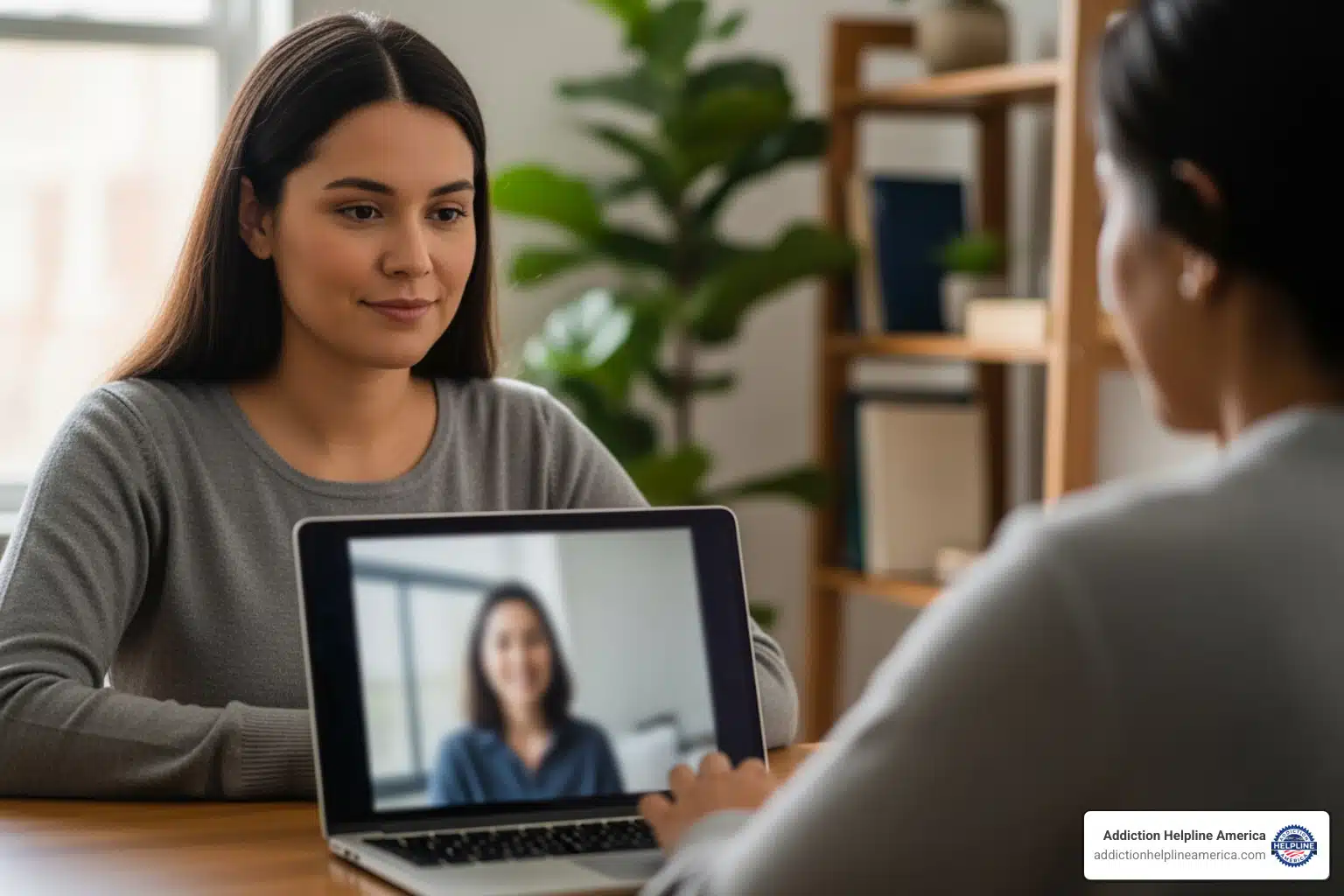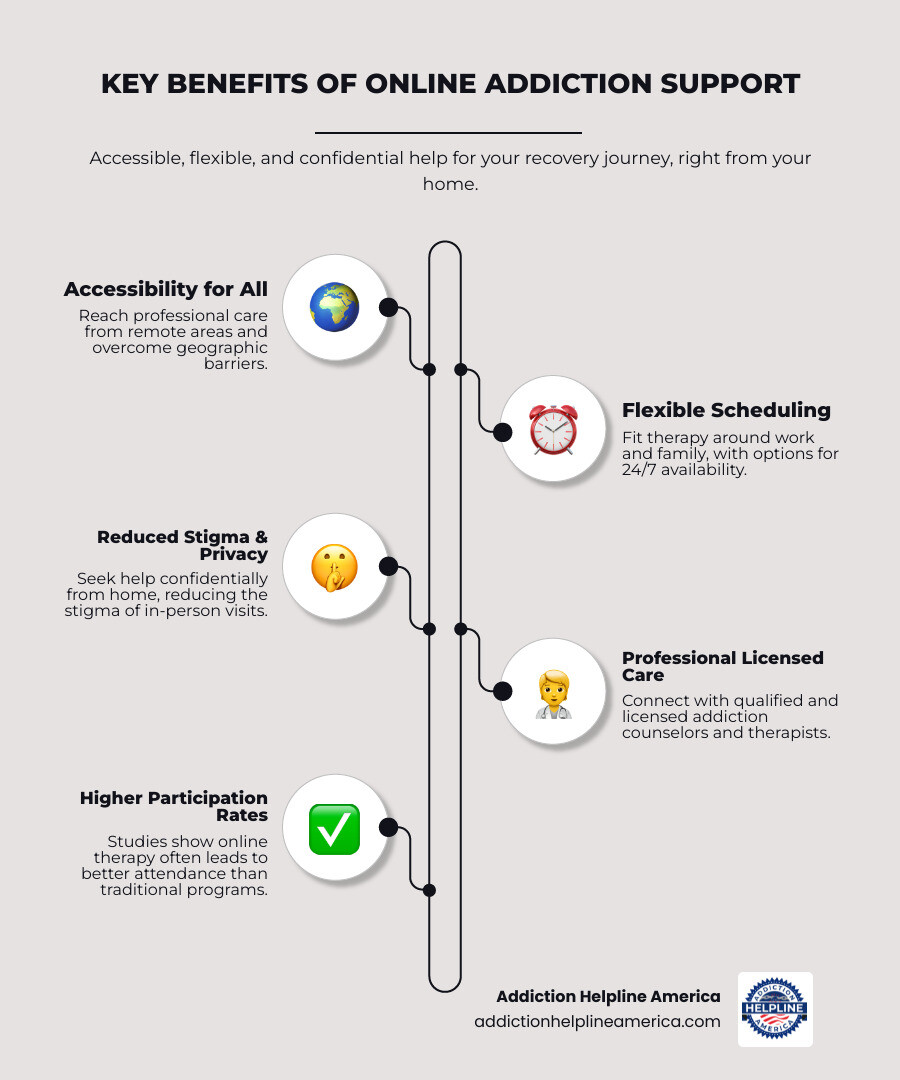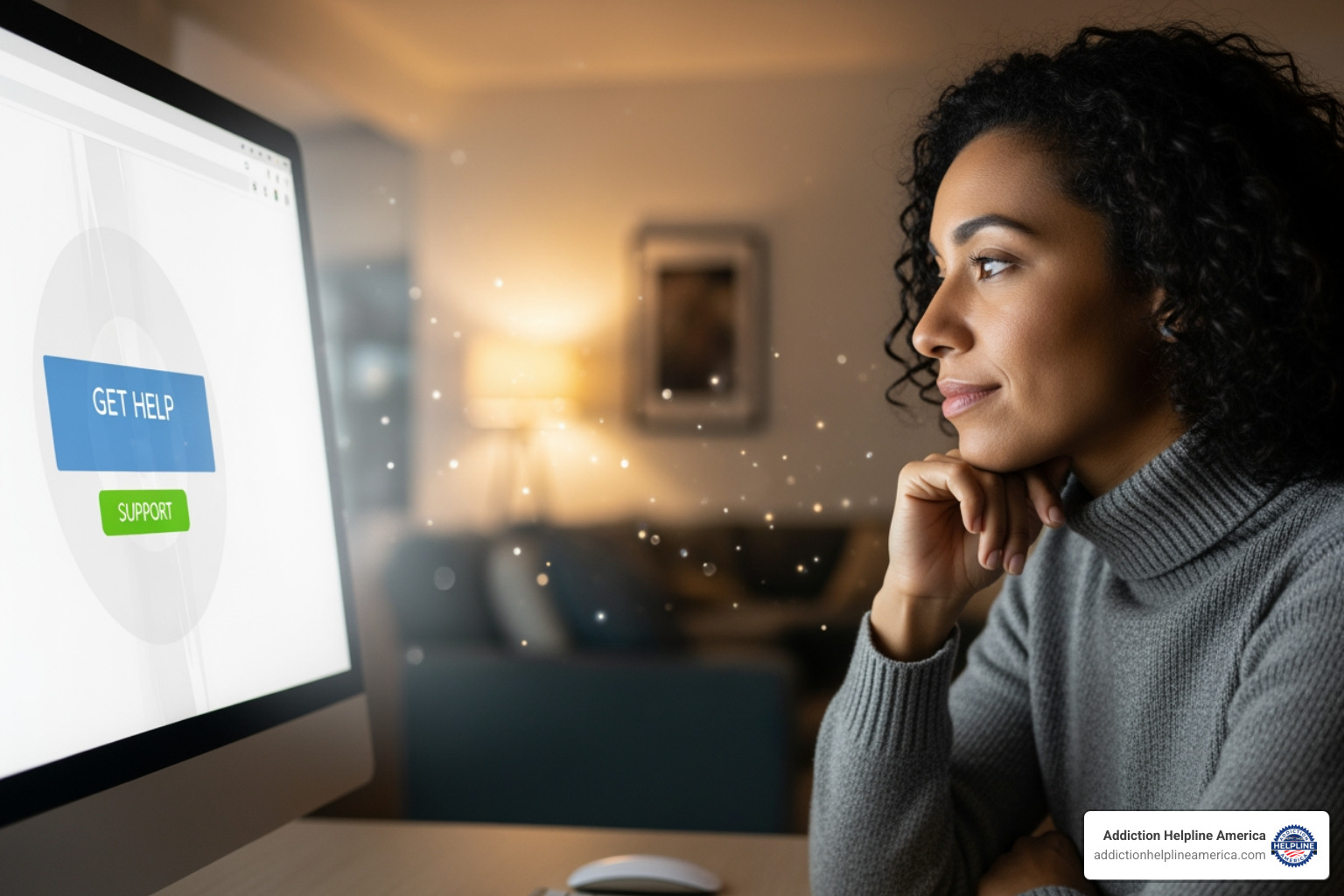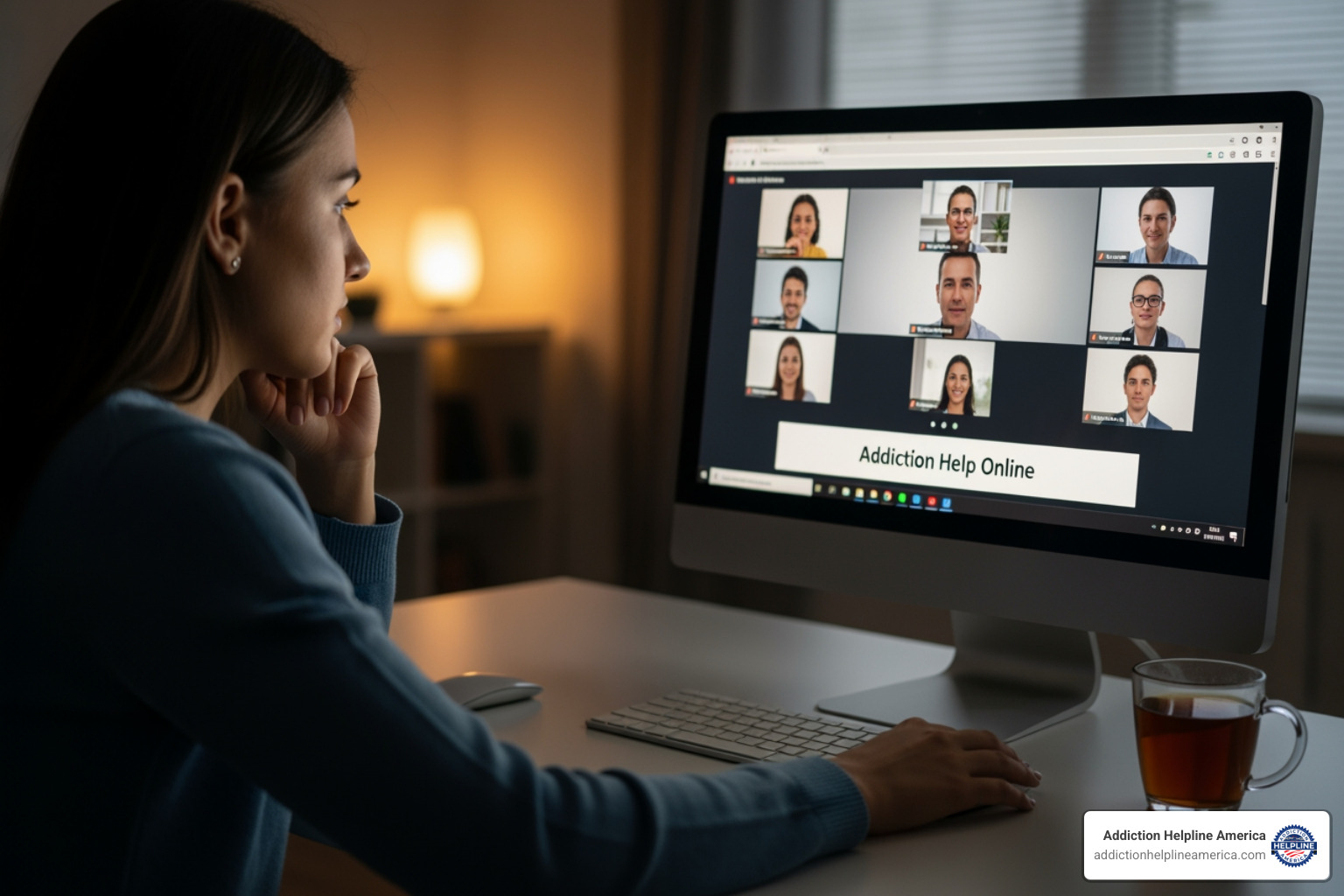
Why Seeking Addiction Help Online Matters More Than Ever
Addiction help online connects you with professional treatment and support through your computer, phone, or tablet. It’s a flexible, private, and effective way to start your recovery journey from wherever you are.
Quick Overview of Online Addiction Help:
- What it is: Remote therapy and counseling via video, phone, or secure messaging.
- Who it’s for: Anyone with substance use or behavioral addictions needing accessible care.
- How to access: Call helplines like SAMHSA (1-800-662-4357), use directories like findtreatment.gov, or contact online therapy platforms.
- Cost: Many insurance plans cover telehealth; some services offer sliding scale fees.
- Best for: Mild to moderate addiction, outpatient care, and ongoing recovery support.
- When in-person is better: Severe withdrawal, medical detox needs, or crisis situations (call 911).
The landscape of addiction treatment has changed. What once required travel and time off work can now happen in the privacy of your home. Research shows that online therapy can be just as effective as in-person treatment for many addiction issues, and over 3 million people have already turned to online platforms for help.
Addiction thrives in isolation, but many people face barriers to traditional treatment, such as geographic distance, work obligations, or stigma. Online addiction help removes these obstacles, making it a lifeline, not just a convenience. Studies show telehealth has better participation rates because it eliminates travel and fits into real-life schedules. Consistent attendance is key to successful outcomes, and online therapy makes that consistency achievable.
At Addiction Helpline America, we connect individuals with comprehensive addiction help online, providing 24/7 confidential support. This guide will walk you through finding effective, safe, and reputable online addiction support.
Explore more about addiction help online:
Understanding Online Addiction Treatment
Addiction help online—also known as teletherapy or virtual rehab—brings professional counseling directly to you. Instead of visiting an office, you connect with licensed addiction professionals through your phone, tablet, or computer from a private, safe location.
It works through several methods. Video conferencing offers a face-to-face session through a screen, allowing for visual cues. Secure messaging or chat provides a way to communicate with your care team between appointments, with some services offering 24/7 support. Phone calls are a vital option for those with unreliable internet or who prefer not to be on camera. Many programs also use mobile apps to help you track progress, manage cravings, and access educational content about how the brain is affected by drug addiction.
Your privacy is paramount. Legitimate addiction help online services must be HIPAA compliant, meaning all communications are encrypted and legally protected. Your conversations remain confidential between you and your treatment team.
What to Expect from a Virtual Session
Your journey begins with an initial assessment, where a licensed clinician discusses your history, challenges, and goals to understand your unique situation. Based on this, they create an individualized treatment plan that might include individual, group, or family therapy, custom to your schedule and needs.
You’ll have scheduled appointments with licensed counselors, building a consistent therapeutic relationship. It’s crucial to find a confidential environment on your end—a private space where you can speak freely without being overheard. This is essential for openly discussing topics like what is drug addiction? and getting the most from your sessions.
The Technology Behind Online Care
You don’t need to be a tech expert. Most providers use secure patient portals where you can log in to manage appointments, message your therapist, and access resources. Therapy sessions occur on encrypted platforms built for healthcare, ensuring your video and audio are scrambled and private. These platforms have user-friendly interfaces, and tech support is usually available.
The main requirement is a stable internet connection for video calls. If that’s an issue, phone-based treatment is an excellent alternative. The goal is to remove barriers, not create them. At Addiction Helpline America, we guide you through these options to ensure you can access care without confusion.
The Pros and Cons of Seeking Addiction Help Online
Choosing between online and in-person treatment is a personal decision. There’s no single right answer, only what works best for your life and needs. Let’s look at the strengths and weaknesses of addiction help online.
| Feature | Online Addiction Treatment | In-Person Addiction Treatment |
|---|---|---|
| Accessibility | High; available from anywhere with internet/phone access, great for rural areas or mobility issues. | Moderate; limited by geographic location, transportation, and physical mobility. |
| Convenience | Very High; flexible scheduling, no travel time, can fit around work/family obligations. | Moderate; requires travel, adherence to fixed schedules, potential time off work. |
| Privacy/Stigma | High; treatment from home reduces public exposure and associated stigma. | Moderate; potential for public recognition, entering/exiting a facility can feel stigmatizing. |
| Cost | Often more affordable (no travel costs), many insurance plans cover virtual options. | Generally higher due to facility overhead, travel, and accommodation (if residential). |
| Emotional Connection | Can be challenging to build rapport initially, reliance on verbal cues. | Often easier to build rapport through direct physical presence and non-verbal cues. |
| Severe Cases | Not ideal for severe withdrawal, medical detox, or immediate crisis intervention. | Essential for medical detox, severe addiction, and crisis management. |
| Non-Verbal Cues | Limited capture of body language, facial expressions may be less clear. | Full capture of non-verbal communication, aiding therapist’s assessment. |
| Environment | Comfortable and controlled home environment, but potential for distractions/lack of privacy. | Structured, dedicated therapeutic environment, free from home distractions. |
| Participation | Higher participation rates due to convenience and reduced barriers. | Can have lower participation rates due to travel and logistical challenges. |
Key Benefits of Virtual Treatment
Accessibility is the biggest advantage. Online therapy removes roadblocks for those in rural areas or with transportation, childcare, or work challenges. This leads to convenience and flexibility, as you can schedule sessions around your life, not the other way around. Research shows this leads to higher participation rates because it’s easier to attend consistently.
Privacy is another key benefit. Receiving care from home reduces the stigma that prevents many from seeking help. It’s also cost-effective, saving money on travel and time off work, with many insurance plans now covering telehealth. Importantly, research shows online therapy can be effective for addiction treatment, producing outcomes comparable to face-to-face counseling. You can learn more about addiction treatment options we connect people with.
Potential Limitations and Drawbacks
Online treatment has its limits. Technology barriers, like an unreliable internet connection or discomfort with devices, can be frustrating. Therapists also miss some non-verbal cues through a screen, which can be important for a full assessment. Finding a truly private space at home can be difficult due to roommates or family, and at-home distractions can pull your focus.
Most importantly, online treatment is not suitable for severe cases. Anyone needing medical detox for substances like alcohol or benzodiazepines requires in-person care, as withdrawal can be life-threatening. Understanding the stages of detox makes it clear why medical supervision is essential for safety. Similarly, crisis situations or severe co-occurring disorders demand immediate, intensive, in-person support.
Types of Online Addiction Therapy and Support Services
Addiction help online offers a diverse range of services, from intensive professional therapy to peer support, designed to meet you at any stage of your recovery.
Professional Therapy and Counseling
Online platforms connect you with licensed professionals for evidence-based care.
- Individual therapy is the cornerstone of treatment, where you work one-on-one with a therapist to address the root causes of addiction. Cognitive Behavioral Therapy (CBT) is highly effective in a virtual format.
- Group therapy provides a powerful sense of community, connecting you with others who share similar struggles in a moderated virtual setting.
- Family counseling helps repair relationships and educate loved ones. The convenience of online sessions makes it easier for family members to participate.
- Medication Assisted Treatment (MAT) combines medication with counseling. Many aspects, like meeting with prescribers and attending therapy, can be managed effectively via telehealth.
The Role of Virtual Support Groups and Communities
Beyond formal therapy, peer support offers encouragement from shared experience. Online support groups are accessible 24/7 and offer anonymity.
- 12-Step Programs: Alcoholics Anonymous (A.A.), Narcotics Anonymous (NA), Al-Anon, Alateen, and NAR-Anon all host extensive virtual meetings.
- Other Support Models: SMART Recovery offers a science-based approach, while Recovery Dharma provides a Buddhist-inspired path. Other resources include Families Anonymous, Herren Project, In the Rooms, and Parents of Addicted Loved Ones.
Levels of Care in Addiction Help Online
Online treatment adapts to your evolving needs.
- Initial Assessment: A comprehensive evaluation determines the appropriate level of care.
- Virtual Intensive Outpatient Programs (IOP): These offer structured treatment (9-15 hours/week) with individual and group therapy, allowing you to live at home.
- Standard Outpatient Care: This less intensive option involves weekly or bi-weekly sessions, ideal for those with milder addiction or as a step-down from IOP.
- Aftercare and Relapse Prevention: Virtual platforms excel at providing ongoing support through alumni groups and continued access to therapists. This is crucial for long-term recovery, as explored in our guide to post-rehab drug rehab aftercare.
Finding Reputable Addiction Help Online
When you’re ready for recovery, it’s crucial to find safe and professional addiction help online. Knowing what to look for can help you choose a trustworthy provider.
How to Find and Vet an Online Provider
Start by verifying licensing and credentials. Therapists should be licensed in your state, ensuring they meet professional standards. Look for accreditation from bodies like CARF or The Joint Commission, which signals a commitment to quality and safety. While patient reviews can offer insight, they shouldn’t be your only factor.
A reliable starting point is government directories. The Substance Abuse and Mental Health Services Administration (SAMHSA) offers a free, confidential, 24/7 helpline for referrals at 1-800-662-HELP (4357) and online at SAMHSA’s National Helpline. Their FindTreatment.gov website allows you to filter specifically for telehealth providers. Vetting a provider is a key step in learning how to stop addiction effectively.
Key Considerations for Choosing an Addiction Help Online Service
Once you have a list of reputable providers, consider these factors to find the right fit:
- Therapy Types: Does the service offer evidence-based approaches like CBT or DBT that suit your needs?
- Therapist Specialization: Look for a therapist with experience in your specific addiction and any co-occurring conditions (dual diagnosis).
- Cost and Insurance: Understand the pricing structure. Many plans cover virtual care, and we can help you verify insurance to clarify your out-of-pocket costs.
- Communication Methods: Choose a platform that offers the methods you’re most comfortable with, whether it’s video, phone, or secure messaging.
- Platform Usability: The technology should be simple and reliable. Look for a demo or trial to test it before committing.
Confidentiality and Privacy in Online Treatment
Your privacy is protected by law. Reputable providers must comply with HIPAA regulations, which set strict standards for safeguarding your health information. All communication and data are protected by data encryption, scrambling it to prevent unauthorized access.
Before starting, you’ll go through an informed consent process explaining their privacy practices. Providers use secure platforms designed for healthcare, not consumer apps like FaceTime. Always review a provider’s privacy policy to understand how your information is handled. You can find more on our privacy policy to see how we protect your information.
Frequently Asked Questions about Online Addiction Help
It’s natural to have questions when considering addiction help online. Here are answers to some of the most common concerns.
Can online therapy address severe addiction or a mental health crisis?
Online therapy is highly effective for many, but it is not for emergencies. If you or someone else is suicidal, experiencing an overdose, or in immediate danger, call 911 right away.
In-person care is necessary for medical detox, as withdrawal from substances like alcohol and benzodiazepines can be life-threatening and requires medical supervision. You can learn more about the stages of detox to understand why this is critical. Severe co-occurring disorders, like active psychosis, may also require the intensive support of an in-person facility.
Online treatment is an excellent choice for outpatient care, for those with mild to moderate addiction, or as a step-down from residential treatment. If you are in crisis, call or text the 988 Suicide & Crisis Lifeline for immediate 24/7 support. You can also find other crisis hotlines on our site.
Is online addiction treatment covered by insurance?
Yes, in many cases. Insurance coverage for telehealth has expanded dramatically, and most major insurance companies now cover online addiction treatment. Medicaid and Medicare coverage varies by state, but many plans include telehealth benefits. Check our resources on rehab centers that accept Medicaid for more information.
The best way to know for sure is by verifying your benefits. Most providers will do this for you at no charge. At Addiction Helpline America, we can help you verify insurance to understand your coverage and any out-of-pocket costs, which are typically lower for virtual programs than for residential treatment.
How effective is online addiction help compared to in-person?
Research findings consistently show that online therapy is just as effective as in-person treatment for many addiction and mental health issues. Studies have found that online cognitive-behavioral therapy (CBT) produces the same positive outcomes as face-to-face counseling.
Patient satisfaction rates are also comparable, with some people preferring the convenience and privacy of their own home. The biggest factor in successful treatment outcomes is consistent attendance. Online therapy excels here, as it removes barriers like travel and scheduling conflicts, making it easier for people to show up for their sessions. Better attendance leads to better results, regardless of the format.
Exploring all alcohol rehab options, both online and in-person, will help you make the best choice for your situation. The bottom line is that online addiction treatment works because it provides quality care in an accessible, consistent way.
Your Path to Recovery Starts Today
Reaching out for addiction help online is a courageous first step. You’ve learned that virtual treatment is effective, convenient, and private, removing many barriers that once stood in the way of recovery. You also understand its limitations and when in-person care is necessary.
The most important takeaway is that recovery is possible, and it begins with the decision to ask for help.
Your journey is unique. Whether you need the privacy of at-home treatment, live far from a facility, or are juggling a busy life, there is a path forward that can work for you. At Addiction Helpline America, we simplify the process of finding that path. Our team offers free, confidential, 24/7 support to help you understand your options and connect with a program that fits your needs.
You don’t need all the answers right now. You just need to take the first step. Recovery is about building a life you don’t need to escape from, and that journey can start today, right where you are.
Contact our Addiction and Rehab Hotlines for confidential help anytime, day or night. We’re ready to listen and guide you toward a new beginning.
Our helpline is 100%
free & confidential
If you or someone you care about is struggling with drug or alcohol addiction, we can help you explore your recovery options. Don’t face this challenge alone—seek support from us.
Programs
Resources
Will my insurance
cover addiction
treatment?
We're ready to help
Find the best
drug or alcohol treatment
center
Are you or a loved one struggling with addiction? Call today to speak to a treatment expert.

















